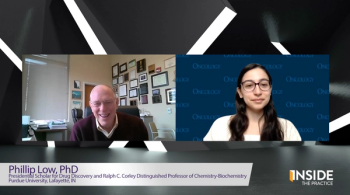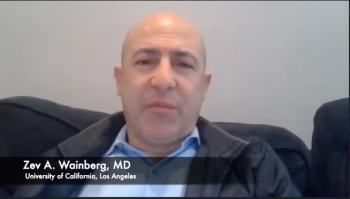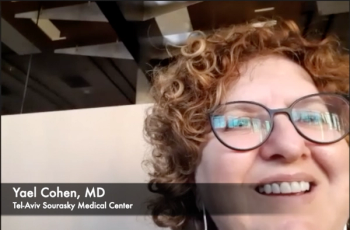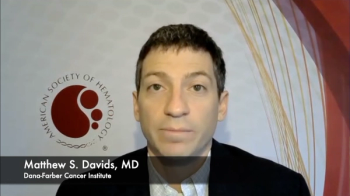
In a regulatory update on cemiplimab for advanced cervical cancer, Regeneron Pharmaceuticals announced that the agent’s biologics license application has been withdrawn.

Your AI-Trained Oncology Knowledge Connection!


In a regulatory update on cemiplimab for advanced cervical cancer, Regeneron Pharmaceuticals announced that the agent’s biologics license application has been withdrawn.

CancerNetwork® spoke with Phillip Low, PhD, about the development and FDA approval of pafolacianine.

Experts in prostate cancer discuss recent advances in the treatment of patients with metastatic castration-naive and metastatic castration-resistant prostate cancer and strategies for optimizing therapy.

Expert panelists follow a patient case to discuss locally advanced and metastatic urothelial carcinoma with a focus on frontline and maintenance therapy.

Fosnetupitant demonstrated non-inferiority and a favorable safety profile vs fosaprepitant for chemotherapy-induced nausea and vomiting.

Zev A. Wainberg, MD, spoke to the rationale for examining the efficacy of pembrolizumab alone and in combination with chemotherapy for patients with advanced gastric and gastroesophageal junction adenocarcinoma.

It is important to tap into interventions that can mitigate a fear of cancer recurrence in the partners of multiple myeloma survivors in addition to improving family hardiness and social support in order to aid in patients' psychological adjustment and wellbeing.

The FDA has given a fast track designation to gedatolisib as a treatment for patients with hormone receptor-positive, HER2-negative metastatic breast cancer.

SNIPR001 has received a fast track designation by the FDA for the prevention of blood infections in patient with hematologic malignancies.

Research from the Journal of Clinical Oncology suggests that venetoclax is a promising option for patients diagnosed with previously treated Waldenström macroglobulinemia.

Yael Cohen, MD, sat down with CancerNetwork® to discuss how the multiple myeloma space is entering into an era of CAR T-cell therapy.

Tislelizumab met the primary end point of overall survival in the phase 3 RATIONALE 305 trial in a population of patients with locally advanced unresectable/metastatic gastric or gastroesophageal junction cancer with a PD-L1–expressing tumor in the first-line setting.

Investigators believe that low-dose CT screenings should only be offered to heavy smokers after identifying an association between the diagnostic and an overdiagnosis in nonsmoking Asian women.

Topline findings from the phase 3 MOMENTUM study indicated that patients with myelofibrosis experienced a statistically significant reduction in symptoms following treatment with momelotinib.

In radiation oncology and medical oncology, representation of female faculty has increased from 1970 to 2019, and representation of individuals from historically underrepresented racial and ethnic groups in medicine remains low.

Yael Cohen, MD, discusses safety data from a clinical trial assessing the use of ciltacabtagene autoleucel in lenalidomide-refractory multiple myeloma.

CancerNetwork® spoke with Rafael Fonseca, MD, about future efforts to compare use of daratumumab-containing regimens as either frontline or second-line therapy in patients with multiple myeloma that are transplant ineligible.

In an interview with CancerNetwork, Don Dizon, MD, FACP, FASCO, discusses key updates that read out in both the gynecologic oncology and breast cancer fields over the course of 2021.

The supplemental biologics license application for cemiplimab plus chemotherapy for patients with advanced non–small cell lung cancer was based on findings from the phase 3 EMPOWER-Lung 3 study and was accepted for review by the FDA.

Tebentafusp has been approved by the FDA based on results of the phase 3 IMCgp100-202 trial for patients harboring HLA-A*02:01 with metastatic uveal melanoma.

Matthew S. Davids, MD, MMSc, spoke about the benefit of venetoclax combinations in patients with chronic lymphocytic leukemia or small lymphocytic lymphoma.

Pemigatinib is a new treatment option following approval from the Hong Kong Department of Health for patients with locally advanced or metastatic cholangiocarcinoma with an FGFR2 fusion or rearrangement following progression on at least 1 prior line of therapy.

Patients with pretreated gastrointestinal stromal tumors who were treated with ripretinib did not reach the primary end point of progression-free survival superiority vs sunitinib in the phase 3 INTRIGUE study.

Improved progression-free survival was observed when treating patients with relapsed/refractory multiple myeloma with melphalan flufenamide plus dexamethasone compared with pomalidomide plus dexamethasone.

Amitkumar Mehta, MD, discusses the role of parsaclisib and how it fits into the treatment landscape of relapsed/refractory mantle cell lymphoma.

Patients with stage IV non–small cell lung cancer treated with sugemalimab plus chemotherapy experienced a prolonged overall survival benefit compared with those who received placebo and chemotherapy.

Patients with recurrent hepatocellular carcinoma after liver transplantation were treated with lenvatinib and saw promising efficacy.

Patients with heavily pretreated metastatic uveal melanoma appeared to benefit from treatment with a synthetic lethal combination of darovasertib and crizotinib.

A retrospective study did not find any associations between survival of older patients with multiple myeloma and pre-diagnosis depressive symptoms and mental health-related quality of life.

The phase 1b KOMET-001 trial, examining the use of KO-539 in patients with relapsed or refractory acute myeloid leukemia, will continue following authorization from the FDA.